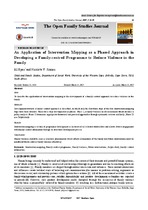An application of intervention mapping as a phased approach in developing a family-centred programme to reduce violence in the family
Abstract
AIM: To describe the application of intervention mapping in the development of a family-centred approach to reduce violence in the family. METHODS: Development towards a family-centred approach is described, in which only the first three steps of the five intervention mapping steps have been detailed. These three steps unpacked as phases. Phase I, a family violence needs assessment which includes a policy analysis. Phase II determines appropriate theoretical and practical approaches through systematic reviews and lastly, Phase III as a Delphi study. RESULTS: Intervention mapping as a form of programme development is inclusive of all relevant stakeholders and allows diverse engagement with family-centred information through its structured development process. CONCLUSION: Family violence should be seen as a holistic phenomenon which affects all members of the family and future interventions must be mindful of this to address family violence effectively.

